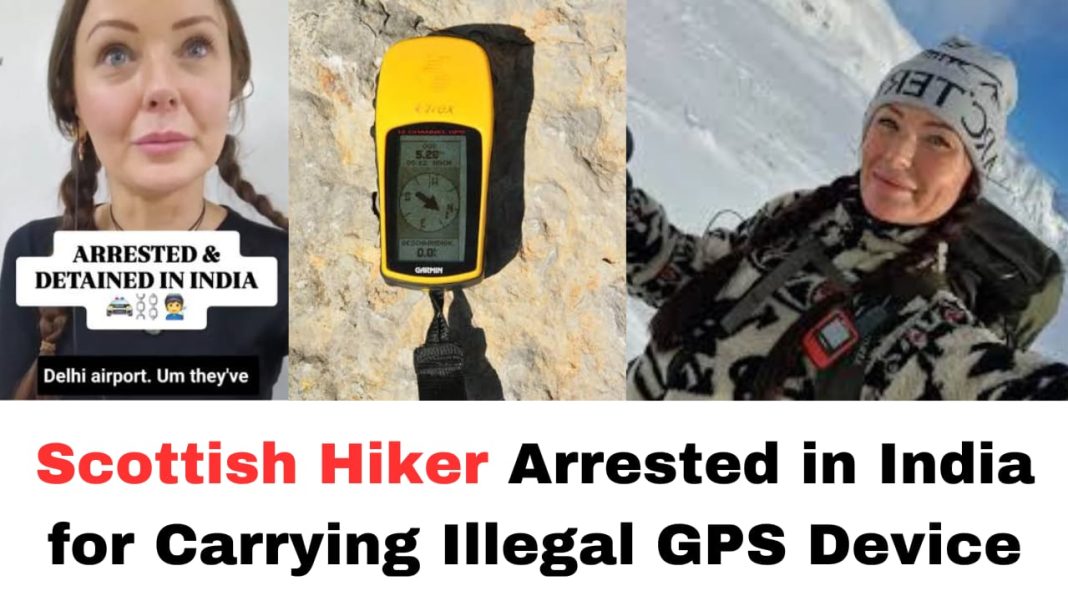Digital News Guru New Delhi Desk:
In a startling turn of events, a Scottish hiker, Heather Mackins, was arrested at Indira Gandhi International Airport in Delhi for carrying a Garmin inReach satellite device, a piece of equipment she reportedly used during her travels in remote areas. The 38-year-old from Scotland had been en route to a yoga and meditation retreat in Rishikesh, India’s spiritual hub, when she was detained for violating the country’s laws surrounding communication devices.
The incident has raised questions regarding travelers’ awareness of local laws, particularly when it comes to technology and communication devices, and it highlights the challenges of navigating the legal landscape in foreign countries. The case also brings attention to India’s stringent regulations on satellite-based devices, which are prohibited without prior permission from the government.
Scottish Hiker Arrested: What Happened at the Airport?
Heather Mackins, an experienced hill-walker known for her passion for outdoor adventures, was on a personal journey to Rishikesh when her trip took an unexpected and unfortunate turn. Upon arriving at the airport, airport security flagged her Garmin inReach device, which allows users to send satellite messages and track their location in remote areas where there is no cellular network coverage. This seemingly innocuous piece of technology, essential for safety in wilderness areas, is illegal in India without an appropriate license due to concerns over security and unauthorized communications.

India’s Wireless Telegraphy Act of 1933 mandates that any wireless communication device, including satellite phones and GPS trackers, must be licensed by the government. The law is designed to prevent the illegal use of communication devices that could potentially compromise national security. While this regulation is clear, travelers—especially those who use such devices for recreational purposes—may not always be aware of the legal requirements.
Upon detection of the device, Heather was arrested and taken to a local police station for questioning. She was detained for several hours, during which time she contacted the British Embassy for assistance. According to reports, Heather was asked to sign several documents during her detention, and she was subsequently released on the condition that she would appear in court at a later date.
The Legal Implications: What Does This Mean for Travelers?
Heather’s case serves as a stark reminder of the importance of understanding local laws, particularly when traveling to foreign countries. While the Garmin inReach is a widely used device among trekkers and adventurers, it is not permitted for use in India unless travelers obtain a license from the government in advance. The British government’s travel advice for India warns that “it is illegal to possess and operate satellite phones and other satellite-enabled navigational devices without a license.” The device, often used by trekkers to stay connected in remote areas, is seen as a potential security threat by Indian authorities, who are particularly concerned about the unauthorized transmission of information.
The situation involving Heather Mackins is not unique. In December 2024, a similar incident occurred when a Canadian national, Tina Lewis, was detained at Goa Airport for carrying a Garmin inReach Mini. Both of these incidents reflect the strict enforcement of India’s communication device regulations, which many international visitors may not fully understand when arriving in the country.

Travelers who use such devices must be cautious and should research the regulations surrounding their use before traveling to countries with restrictive laws. In the case of India, travelers must be particularly vigilant when carrying communication devices that rely on satellite technology. India’s authorities have expressed concerns over the potential misuse of such technology for espionage or other activities deemed harmful to national security.
The Bigger Picture: Understanding the Regulatory Landscape
India’s regulations on communication devices, while strict, are not unique. Many countries, including China and Russia, have similar laws that restrict the use of satellite phones and GPS tracking devices. These laws are generally enacted with national security concerns in mind, and they highlight the growing challenges of balancing security and personal freedoms in an increasingly connected world.
Satellite devices like the Garmin inReach are widely used in outdoor and adventure tourism, providing users with essential tools to navigate remote terrain and ensure their safety. In regions where mobile network coverage is sparse or nonexistent, these devices have become essential for hikers, trekkers, and adventurers. However, in countries with stringent regulations, such as India, travelers who bring such devices may find themselves in legal jeopardy if they are not aware of the rules.
India’s laws on satellite communication devices reflect the broader concerns of many governments worldwide regarding the risks associated with unregulated communication technology. While India’s regulations are well-intentioned in terms of security, they can create complications for international travelers who may be unaware of the restrictions.
Lessons Learned: A Cautionary Tale for International Travelers
Heather’s experience serves as a cautionary tale for travelers planning to visit countries with strict regulations surrounding technology and communication devices. It emphasizes the need for thorough research before traveling, particularly when it comes to the legalities of bringing devices like GPS trackers, satellite phones, and other communications technology.
Heather, who shared her ordeal on social media, has urged other travelers to be aware of the legal implications of carrying such devices when visiting India and other countries with similar regulations. In a post on Instagram, she advised fellow adventurers to avoid bringing Garmin inReach or similar devices into India without obtaining the necessary permits in advance.

While Heather was eventually released on the condition that she would return for a court appearance, the incident has prompted many to reconsider the importance of understanding local laws before traveling abroad. Her case underscores how easily well-meaning travelers can find themselves in legal trouble for carrying devices that may seem innocuous but are, in fact, strictly regulated.
Conclusion: The Importance of Research and Compliance
The arrest of Heather Mackins serves as a reminder of the importance of understanding and complying with local laws, especially when traveling to countries with stringent regulations. In this case, Heather’s use of a Garmin inReach device, while common among outdoor enthusiasts, led to her arrest due to India’s laws regarding satellite communication devices. Her story highlights the need for travelers to research the legalities of carrying certain technology, particularly in countries with strict security regulations.
As international travel continues to grow, travelers must be more proactive in ensuring they comply with local laws and regulations to avoid similar incidents. In this increasingly interconnected world, awareness and preparation are key to ensuring a smooth and trouble-free travel experience.
You May Also Read: Concerns Over Chinese Hydropower Dam: A Growing Issue Between India and China








